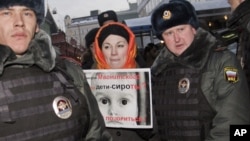Russian President Vladimir Putin has signed into law a ban on American adoptions of Russian children. The Russian law was passed in response to America’s Sergei Magnitsky Rule of Law Accountability Act, which sanctions Russian officials who are guilty of corruption and human rights violations. Magnitsky was a Russian hedge-fund lawyer who died in prison after exposing corruption and tax fraud among top Russian officials.
The United States deeply regrets Russia's passage of a law ending adoptions between the United States and Russia. American families have adopted over 60,000 Russian children over the past 20 years, and the vast majority of these children are now thriving thanks to their parents' loving support.
The Russian government's politically motivated decision will reduce adoption possibilities for children who are now under institutional care. The United States regrets that the Russian government has taken this step rather than seek to implement the bilateral adoption agreement that entered into force in November.
The U.S. is further concerned about statements that adoptions already underway may be stopped and hopes that the Russian government would allow those children who have already bonded with their future parents to finish the necessary legal procedures so that they can join their families.
The new legislation also restricts Russian civil society organizations that work with American partners. The law allows the Ministry of Justice to arbitrarily stop activities and freeze the assets of nongovernmental organizations, or NGOs, that they consider to be involved in political activities, receive funding from U.S. citizens or organizations or conduct activities threatening to the interests of the Russian government.
It also bans persons who are U.S. and Russian dual nationals from being a leader or a member of a Russian, international or foreign NGO participating in ‘political activities’ in Russia. Organizations, or their branches which violate this rule, could be closed and their property seized.
The Russian law will make it more difficult for Russian and American NGOs to cooperate in areas of human rights advocacy, open government, and electoral transparency. The United States remains committed to supporting the development of civil society and the democratic process around the world, including in Russia.
The United States deeply regrets Russia's passage of a law ending adoptions between the United States and Russia. American families have adopted over 60,000 Russian children over the past 20 years, and the vast majority of these children are now thriving thanks to their parents' loving support.
The Russian government's politically motivated decision will reduce adoption possibilities for children who are now under institutional care. The United States regrets that the Russian government has taken this step rather than seek to implement the bilateral adoption agreement that entered into force in November.
The U.S. is further concerned about statements that adoptions already underway may be stopped and hopes that the Russian government would allow those children who have already bonded with their future parents to finish the necessary legal procedures so that they can join their families.
The new legislation also restricts Russian civil society organizations that work with American partners. The law allows the Ministry of Justice to arbitrarily stop activities and freeze the assets of nongovernmental organizations, or NGOs, that they consider to be involved in political activities, receive funding from U.S. citizens or organizations or conduct activities threatening to the interests of the Russian government.
It also bans persons who are U.S. and Russian dual nationals from being a leader or a member of a Russian, international or foreign NGO participating in ‘political activities’ in Russia. Organizations, or their branches which violate this rule, could be closed and their property seized.
The Russian law will make it more difficult for Russian and American NGOs to cooperate in areas of human rights advocacy, open government, and electoral transparency. The United States remains committed to supporting the development of civil society and the democratic process around the world, including in Russia.




